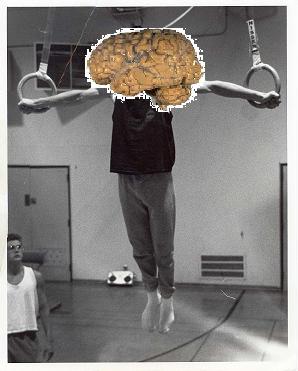Internet "gyms" promise to improve your mental abilities - is there any cover for the promise?

By: Yitzhak Farnes
In recent years we have witnessed a new phenomenon: brain exercise software. These brain gyms may not require you to get out of your couch (or computer chair), but they certainly require your time and money. Websites such as cognifit, lumosity, sharp brains, vigorous mind and many others promise to improve a variety of cognitive performance, starting with memory and ending with logic. Do the programs really improve the general activity of the brain?
In the late 50's and early 60's of the 20th century, three researchers from Harvard University, Hubble, Wiesel and Lewey, conducted an ingenious experiment in its simplicity. They took monkeys immediately after their birth and up to six days after and closed one of their eyes for three weeks. When they opened the closed eye it was blind and remained so for the rest of the monkey's life. It turned out that the open eye, which was active, took over the area of the brain that was normally associated with the closed eye. If this experiment is repeated in three-month-old monkeys, closing one eye does not impair vision in that eye. These experiments and many others showed that the development of the connections between the nerve cells in the brain, the synapses, is determined not only by a genetic program, but also by the level of activity in the neural pathways. In the last decades, they found that the strength of the synaptic connections between nerve cells is not constant. Synaptic connections strengthen when the synapse is active and weaken when it is inactive, a feature that has received the name "plasticity of the brain", meaning the ability to reshape it. It turns out that learning and memory processes and cognitive processes involve the activation and strengthening of synapses. These results led to the idea that the more we activate the brain, the better its functioning.
The idea was that just as physical exercise strengthens the muscles of the body (including the heart muscle), and just as increased activation of the blood circulation improves blood flow and drinking water improves kidney function, so it would be possible to improve learning processes, memory, thinking and other cognitive processes through exercises for brain training. This is the basis of the "gym" industry: various computer exercises that are supposed to develop thinking ability and system analysis, learning ability, memory, etc.
In muscle exercises the picture is simple. We know that exercising one muscle only strengthens that muscle and no other. For example, exercises to strengthen the chest muscles do not strengthen the leg muscles. Does the same principle also work in brain training? Will increased activation of one brain pathway by a certain type of exercise strengthen only that trait or also other traits related to other brain pathways? And in general, what are the right exercises for brain exercise, since we don't know what the basic mechanisms are related to cognitive processes?
In June 2010, an article examining brain training was published in the prestigious scientific journal Nature. Groups of researchers from the universities of Cambridge, London and McMaster tested the effect of "brain exercises" on learning ability, memory, associative learning and logic. 11,430 people of different ages participated in the experiment and without any special selection processes. The subjects were divided into three groups: two groups, we had 4,000 subjects each, performed two different series of exercises, while the third group did not perform any exercises at all. All participants were evaluated through various exercises on the first day of the experiment and after six weeks, during which the subjects of the first groups "exercised" for half an hour at least three times a week. The results of the study showed that the trainees improved only in the exercise they practiced and not in performing other exercises. No differences were found in the general performance capacity of the brain between the two groups that performed exercises and the control group that did not exercise. The researchers therefore concluded that practicing for six weeks does not improve the general ability of the brain. This research shows, at least for now, that brain exercise as offered in "brain gyms" or in exercises found on the Internet does not improve brain performance in general. The researchers caution that years of doing brain exercises may improve cognition, but this has not been tested.
But what can be useful? There are studies that show that in people who carry out prolonged intellectual activity for years, the ability to learn, think and analyze problems exceeds that of people who, in general, do not carry out intellectual activity.
Yitzhak Ferns is a professor in the Department of Neurobiology of the Hebrew University in Jerusalem, the founder of the Israeli Association for Neuroscience and the founder of Belmonte Youth Labs in Jerusalem.

4 תגובות
http://www.clalit.co.il/HE-IL/Family/parents/adhd/articles/ritalin_safe.htm?utm_source=newsletter&utm_medium=email&utm_campaign=nov9_2011
It's funny to see right at the end of the article an advertisement for software to improve memory...
What is genius in a poor experiment that abuses monkeys of their day? I understand that the experiment is sponsored by science blah blah blah, but when you write about it, try not to get excited like a little kid. It's ridiculous.
Abby, save us from the onslaught of Ritalin commercials in Wyant
And publish the study that came out this week in the Lancet on changing nutrition in children and eliminating attention disorders
within 5 weeks in two thirds of the children
http://www.dutchnews.nl/news/archives/2011/02/special_diet_helps_twothirds_o.php
A link to the original study is in the body of the article